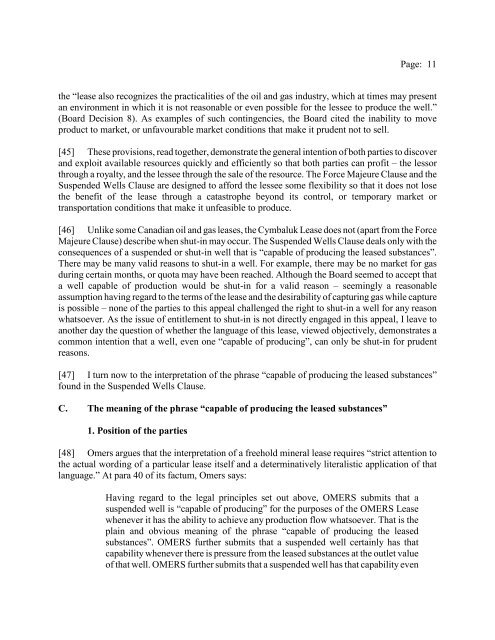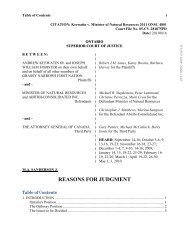Omers Energy Inc. v. Alberta (Energy Resources Conservation Board)
Omers Energy Inc. v. Alberta (Energy Resources Conservation Board)
Omers Energy Inc. v. Alberta (Energy Resources Conservation Board)
- No tags were found...
Create successful ePaper yourself
Turn your PDF publications into a flip-book with our unique Google optimized e-Paper software.
Page: 11the “lease also recognizes the practicalities of the oil and gas industry, which at times may presentan environment in which it is not reasonable or even possible for the lessee to produce the well.”(<strong>Board</strong> Decision 8). As examples of such contingencies, the <strong>Board</strong> cited the inability to moveproduct to market, or unfavourable market conditions that make it prudent not to sell.[45] These provisions, read together, demonstrate the general intention of both parties to discoverand exploit available resources quickly and efficiently so that both parties can profit – the lessorthrough a royalty, and the lessee through the sale of the resource. The Force Majeure Clause and theSuspended Wells Clause are designed to afford the lessee some flexibility so that it does not losethe benefit of the lease through a catastrophe beyond its control, or temporary market ortransportation conditions that make it unfeasible to produce.[46] Unlike some Canadian oil and gas leases, the Cymbaluk Lease does not (apart from the ForceMajeure Clause) describe when shut-in may occur. The Suspended Wells Clause deals only with theconsequences of a suspended or shut-in well that is “capable of producing the leased substances”.There may be many valid reasons to shut-in a well. For example, there may be no market for gasduring certain months, or quota may have been reached. Although the <strong>Board</strong> seemed to accept thata well capable of production would be shut-in for a valid reason – seemingly a reasonableassumption having regard to the terms of the lease and the desirability of capturing gas while captureis possible – none of the parties to this appeal challenged the right to shut-in a well for any reasonwhatsoever. As the issue of entitlement to shut-in is not directly engaged in this appeal, I leave toanother day the question of whether the language of this lease, viewed objectively, demonstrates acommon intention that a well, even one “capable of producing”, can only be shut-in for prudentreasons.[47] I turn now to the interpretation of the phrase “capable of producing the leased substances”found in the Suspended Wells Clause.C. The meaning of the phrase “capable of producing the leased substances”1. Position of the parties[48] <strong>Omers</strong> argues that the interpretation of a freehold mineral lease requires “strict attention tothe actual wording of a particular lease itself and a determinatively literalistic application of thatlanguage.” At para 40 of its factum, <strong>Omers</strong> says:Having regard to the legal principles set out above, OMERS submits that asuspended well is “capable of producing” for the purposes of the OMERS Leasewhenever it has the ability to achieve any production flow whatsoever. That is theplain and obvious meaning of the phrase “capable of producing the leasedsubstances”. OMERS further submits that a suspended well certainly has thatcapability whenever there is pressure from the leased substances at the outlet valueof that well. OMERS further submits that a suspended well has that capability even
















